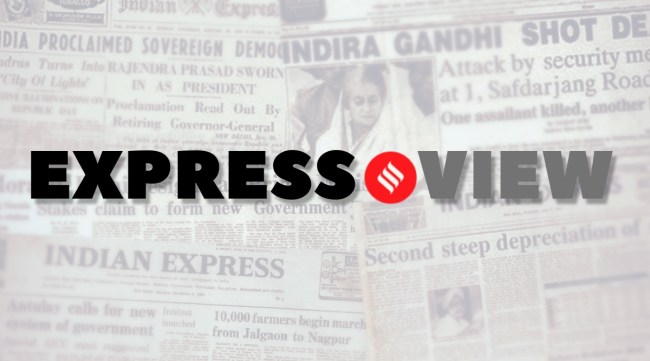Opinion Tamil Nadu’s breakfast scheme for students offers a welcome shift in political campaigning
The contours of the campaign can be designed as per local needs and contexts, but in a country that has historically been stingy about investing in education – about 3 per cent of GDP is spent on education as against the NEP proposed benchmark of 6 per cent – political parties foregrounding education as a “duty” is a good move
 The Dravidian Movement saw education as a key factor in empowering the masses, especially those from the socially and educationally backward communities.
The Dravidian Movement saw education as a key factor in empowering the masses, especially those from the socially and educationally backward communities. Chief Minister M K Stalin’s initiative to provide free breakfast to students in primary schools takes forward the idea of welfare that previous governments in Tamil Nadu have championed. This welcome step, expected to cost Rs 12.75 per student and benefit a total of 1.14 lakh students in classes 1 to 5 across the state, takes forward the universal mid-day meal scheme that the state pioneered in 1983. CM Stalin, however, has sought to frame the initiative in the context of the ongoing debate on freebies and spin it as evidence of an alternative political approach to governance: He said, “It is not a freebie, charity or incentive because it is the government’s responsibility.” This is in sharp contrast to his predecessors, who understood the electoral potential of free food to school children but did not bother to project it as an instrument of the ideal of social justice championed by the Dravidian Movement.
The Dravidian Movement saw education as a key factor in empowering the masses, especially those from the socially and educationally backward communities. The mid-day meal scheme in schools, universalised under M G Ramachandran in the 1980s, helped in improving school enrolment and nutritional levels among children. The Stalin government, however, seems to recognise that while free food can be an eye-catcher, the issues in education are far more complex, especially in the wake of the crisis triggered by Covid-19, and cry for out-of-the-box policy interventions. For instance, the pandemic years have led to a marked decline in learning outcomes. The initiatives launched to address these concerns may have a deeper bearing on the education sector than the breakfast scheme, which, of course, is a necessary intervention, particularly since a government survey had found that over 25 per cent students attend school without having breakfast. Initiatives such as Illam Thedi Kalvi (Education reaches home) and Ennum Ezhuthum (Arithmetic, reading and writing) are aimed at bridging learning deficiencies by reaching out to students in their homes. Similarly, schemes such as Puthumai Penn Thittam for college girls and Naan Mudhalvan for preparing high school students about courses and careers are potentially transformative programmes. But these will be judged on how well they deliver on ground.
What’s welcome is the emergence of education as a political campaign plank, an idea that the AAP tested with some success in the Delhi assembly elections. The contours of the campaign can be designed as per local needs and contexts, but in a country that has historically been stingy about investing in education — about 3 per cent of GDP is spent on education as against the NEP proposed benchmark of 6 per cent — political parties foregrounding education as a “duty” is welcome.





